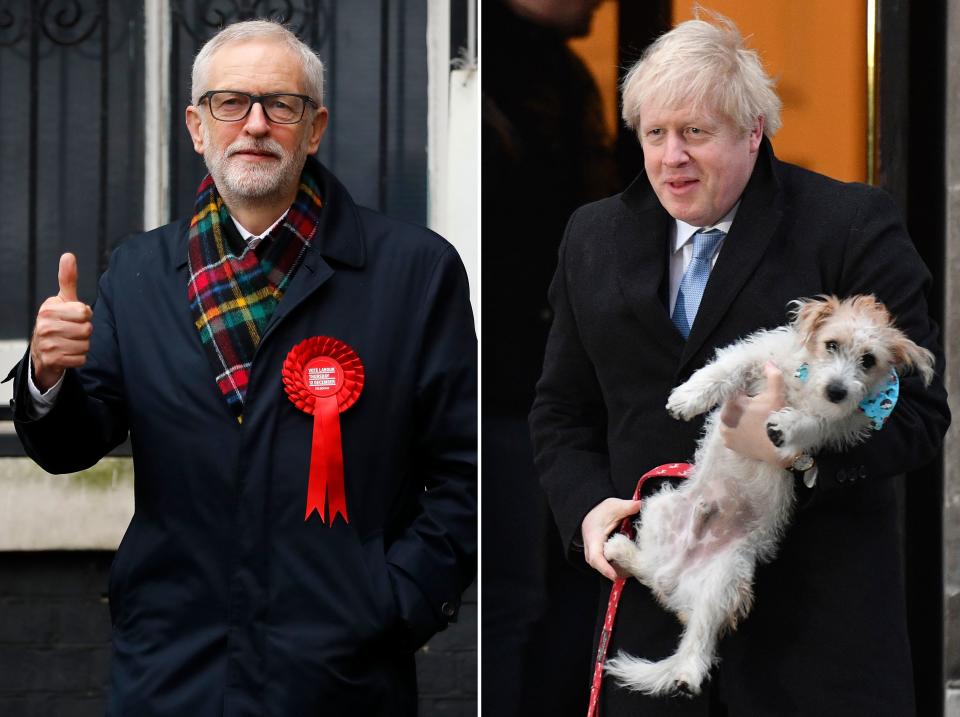General election 2019 exit poll predicts huge Conservative win
The Conservative Party are on track for a resounding victory in the general election, according to a closely watched poll of voters.
The exit poll for the 2019 general election predicted the Conservatives will win 368 seats, a gain of 50 since the last election and well above the 326 seats needed in parliament to form a government.
Labour is forecast to win just 191 seats, 71 fewer than in the last election. The Scottish National Party (SNP) is on track for 55 seats and the Liberal Democrats are forecast 13 seats.
The pound jumped 2% against the dollar (GBPUSD=X) after the exit poll was published.

The exit poll, published at 10pm, “will help define the night,” an employee at a major US bank told Yahoo Finance UK ahead of the result.
“As they have been quite accurate recently, there should be a good steer on the outcome and [expect] some trading for the following 15 to 30 minutes.”
READ MORE: The stocks most exposed to the UK general election
The exit poll is conducted by YouGov and is based on a survey of voters at strategically important polling stations across the country. The results of those surveys are then plugged in to a statistical model.
The final result of the election is expected to come in roughly 5-6am local time, although this is subject to change if recounts are needed.
The accuracy of exit polls
While exit polls are closely watched, they do have a margin of error — as the inventor of the statistical methodology highlighted this in a statement this week.
“Any exact prediction of seats won by the largest party, such as seen in both 2005 and 2010, owes as much to luck as it does to sound statistical thinking,” said Professor David Firth, from Warwick University's Department of Statistics. “There is nothing in the new methods that guarantees such freakish accuracy.”
The biggest historical mismatch between the exit poll and the final result was in 2015, when the exit poll was out by 15 seats.
However, the way in which Brexit is influencing voter behaviour and the unusually high turnout means there may be more scepticism around the polls.
"The main point here is this: While better methodology has radically improved the chances of an accurate prediction from the exit poll at a UK general election, the super-accurate predictions seen in 2005, 2010 and even 2017 were unwarrantably accurate,” said Professor Firth.
“Such an astounding level of accuracy is not guaranteed by the statistical methods used, and it definitely should not be expected every time."
Any party needs 326 seats out of a possible 650 to gain a clear majority in parliament.
What the other major poll said before the election
A day before Brits went to vote, a survey by respected pollsters YouGov showed Boris Johnson’s Conservative Party was on course to win a majority.
YouGov used a technique known as multilevel regression and post-stratification (MRP), a process that helped to correctly predict 93% of the results in the 2017 general election.
YouGov polled 100,000 panellists across the UK over a seven day period. The survey suggested the Tories would snap up 339 seats and Britain’s main opposition party Labour, led by Jeremy Corbyn, would gain 231. The Liberal Democrats, led by Jo Swinson, were forecast to secure just 15 seats, while the Scottish National Party were expected to get 41.
What are the key moments of the night?

Results are announced constituency by constituency. However, analysts and traders should get a sense of which way things are going from certain early results. Seats to watch include:
Workington, which is expected to flip from Labour to Conservative and should report around 1am;
Bury South, a Tory marginal seat that the party hopes to hold and should report around 2am;
Clywd South and West Bromwich East, two more constituencies forecast to flip from red to blue and likely to report around 2am;
West Bromwich West, a marginal the Tories hope to hold and will report around 2am.
Neil Wilson, chief market analyst at Markets.com, said: “If these start to turn blue then the night is very much going the way of the Conservatives.”
Results from the UK’s 650 constituencies will continue to roll in throughout the night, with most results expected by 5am.
How will traders react?
If early seats go the Tories way, most traders should head to nearby hotels or quiet corners of the office to get some shut eye by 2am
While it looks unlikely now, any prospect of a hung parliament would leave traders scrambling for signs of what type of coalition government looks likely. Nomura’s foreign exchange strategist Jordan Rochester said the number of Tory seats would be closely watched to try and work out if another coalition with the DUP is possible.
READ MORE: What a hung parliament could mean for markets
Rochester said statements from Liberal Democrat leader Jo Swinson could also move markets if her party emerges as a power broker. A coalition with Labour would be seen as negative in the markets, while a willingness to work with the Tories could boost sterling.
The London Stock Exchange opens for business at 8am and equity traders won’t waste time getting to work.
As with the pound, expect a rally in UK-focused stocks like banks, house builders, and retailers if the Tory victory is confirmed. Utility stocks should also enjoy a ‘relief rally’ as the threat of Labour nationalisation recedes.
After major moves at the open, any changes in both stocks and exchange rates should quieten down.

